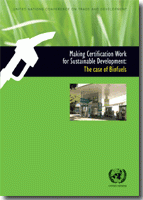
This study aims to provide policymakers with an overview of biofuel certification schemes that are already in place or being developed, including:
- Benefits and drawbacks of such schemes.
- Implications for developing countries.
- Possible ramifications of certification in the context of WTO.
Some suggestions on how to ensure that biofuels certification is indeed conducive to sustainable production in all regions are offered at the end of the study.
The issue of certification of biofuels has been raised in numerous meetings organized by the UNCTAD Biofuels Initiative and has been addressed in past reports.
The international debate on biofuel is becoming vocal. Doubts are increasingly being voiced about the overall positive impact of biofuels and some feel that the possible negative side effects of biofuels production and use - especially in relation to food security and environmental preservation - may eclipse the potential benefits.
Certification is therefore seen as an instrument that can both encourage sustainable biofuels production and prove it.
Certifying biofuels may then become a precondition for biofuels to be counted towards national utilization targets or for benefiting from tax breaks and other incentives. It may also become a prerequisite for consumers´ acceptance.
These developments make certification an increasingly important issue, including in international trade.
Four groups are involved in the development of biofuels certification schemes, namely national Governments and regional groupings; companies; non-governmental organizations; and international organizations and initiatives. The numerous initiatives being undertaken are in various stages of development, ranging from the discussion phase to full implementation.
Certification raises a number of concerns related to the kind of criteria included in the schemes, the proliferation of parallel programmes, their compatibility with multilaterally-agreed trade rules, the cost of certification, and developing country ability to participate in the standard development process.


